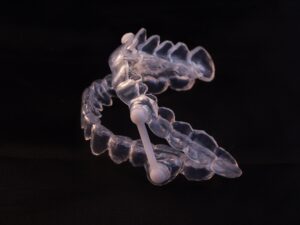 Obstructive sleep apnea (OSA) is a common breathing-related disorder. Researchers estimate that 1 in 15 Americans have sleep apnea, which causes frequent breathing disturbances. With no treatment, obstructive sleep apnea can have negative effects on physical and psychological health. A CPAP machine is the most traditional method of treating sleep apnea, but it often has a low compliance rate, despite its effectiveness. If you find a CPAP bothersome, or are looking for an alternative treatment, you may be a candidate for oral appliance therapy. Here’s how the custom-fit device may help you breathe and sleep better.
Obstructive sleep apnea (OSA) is a common breathing-related disorder. Researchers estimate that 1 in 15 Americans have sleep apnea, which causes frequent breathing disturbances. With no treatment, obstructive sleep apnea can have negative effects on physical and psychological health. A CPAP machine is the most traditional method of treating sleep apnea, but it often has a low compliance rate, despite its effectiveness. If you find a CPAP bothersome, or are looking for an alternative treatment, you may be a candidate for oral appliance therapy. Here’s how the custom-fit device may help you breathe and sleep better.
What is Obstructive Sleep Apnea?
Obstructive sleep apnea is the most prevalent form of the sleep-related breathing disorder. Breathing disruptions are caused by a narrowed air passage that’s created from the soft tissues in the back of the mouth or the tongue collapsing. As the muscles relax when sleeping, they can create an obstruction that may cause you to stop breathing potentially hundreds of times per night.
Each event of oxygen deprivation stresses your body and interrupts your sleep cycle. You can be at risk of several potentially deadly health conditions with no treatment, including heart disease and diabetes. Lack of sleep can lead to depression, memory loss, and even an increased risk of auto accidents.
Disadvantages of a CPAP
A CPAP machine delivers pressurized air through a nasal mask to prevent breathing disturbances. Although it is effective in treating sleep apnea, studies have found that 50% of CPAP users discontinue treatment within 1 year.
A CPAP can be bothersome because you must wear masking and you’re attached to a hose, which may restrict some movements. Not to mention, some machines are noisy or bulky, which can be inconvenient if you travel often. In addition, they require proper cleaning and maintenance to avoid health issues, like lung infections. If you’re feeling the restrictions of a CPAP and can’t get the rest you need, you have another option.
Benefits of an Oral Appliance
The FDA has cleared oral appliances for the treatment of patients with mild-to-moderate OSA. The custom-fit device moves your jaw and tongue into more natural positions to keep your airway open. Over time, your jaw may come to rest in this new position on its own, providing long-term relief.
Studies have shown that the oral appliance compliance rate is as high as 90% because it is small, comfortable, and discreet. You don’t have to worry about masking, hosing, or noise. An oral appliance is easy to clean and maintain to last for several years.
If you’re ready to stop snoring, or cut ties with your CPAP machine, an oral appliance may be the solution for you.
About Dr. John Warwick
Dr. Warwick has over 30 years of experience in dentistry. He achieved his dental degree from the University of Pittsburgh School of Dental Medicine and has continued his training in various specialties, including oral appliance therapy and obstructive sleep apnea. Dr. Warwick has the solutions you need to breathe better. Request an appointment through his website or call his office at (412) 819-1319.

